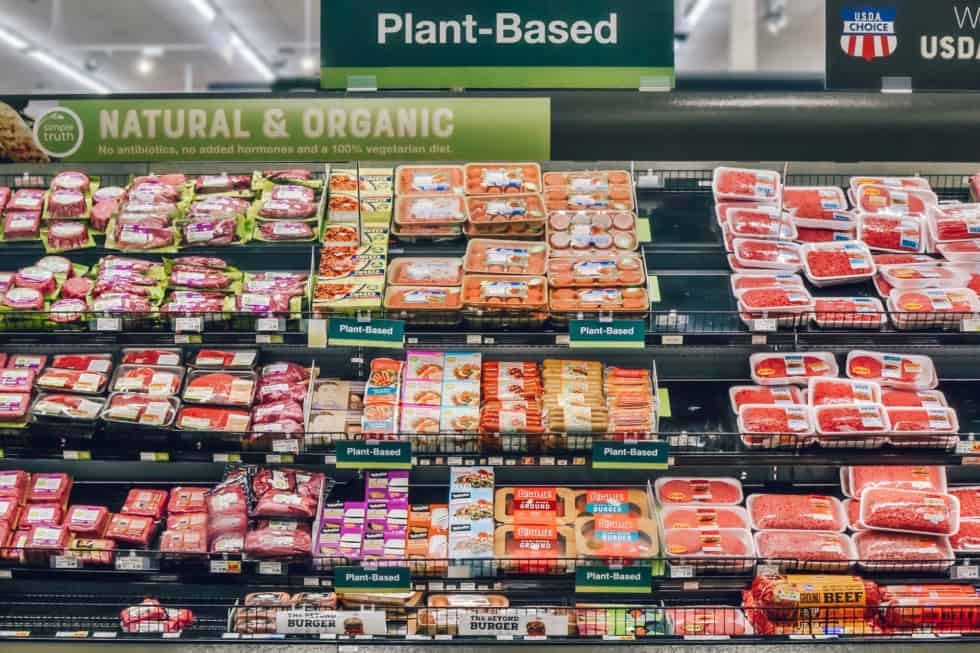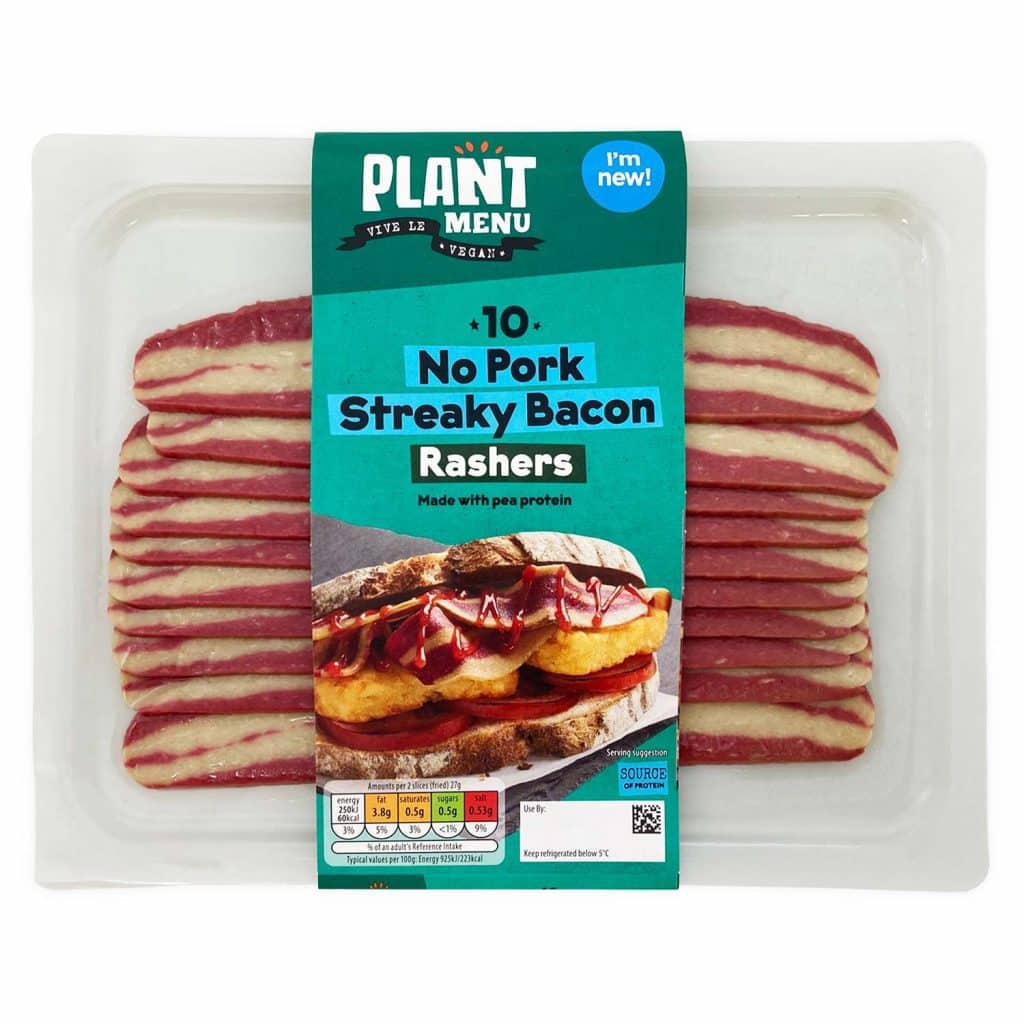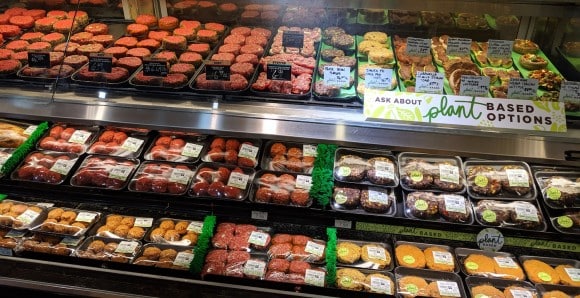Introduction
Retailers are scrambling to enact their net-zero plans in order to keep pace with governmental climate targets and modern consumer expectations. However, structural challenges are making it difficult for many retailers to effect change quickly and profitably. These problems range from internal competition between departments, misalignment between profit and net-zero targets, and lack of visibility suppressing demand for sustainable alternative foods.
With a few simple organizational changes, retailers can unlock greater revenues while accelerating the achievement of their sustainability goals. Those leading the way are already seeing the benefits. For instance, British multinational retailer Tesco has invested heavily in developing a premium, own-label vegan range called Wicked Kitchen, which aims for price parity with conventional products, and is available nationwide. This innovation required alignment between their product development, marketing, merchandising, and corporate social responsibility (CSR) teams, as well as clear briefs for all store managers. The cohesive effort has paid off, as the range has proven to be highly popular with flexitarian consumers. Sales of Wicked Kitchen products doubled between January 2021 and January 2022.1
“Retailers are key actors within the value chain and have an important role to play in promoting sustainability,” notes Cliona Howie, Executive Director at environmental-impact-labelling NGO Foundation Earth (UK). But the retailer’s role goes beyond simply communicating with consumers, adds Stephanie Jaczniakowska-McGirr, Director of Corporate Engagement at ProVeg International.
To meet their net-zero targets, retailers need to be inward-looking too. By restructuring core operational models around sustainability, retailers can actually enhance and future-proof their bottom lines. The overlap between plant-based products, net-zero targets, mainstream consumer demand, and profitability is huge.”
Read on to learn about the five organizational tactics that retailers should be implementing to meet their sustainability goals while increasing plant-based revenues — and discover which businesses are already leading the way.
1) Have a single protein buyer
Many retailers still have different category buyers for their plant-based and animal-based products. These retailers have unwittingly created an internal zero-sum game within their businesses, whereby one protein buyer can only succeed at the expense of their colleagues. This internal rivalry is especially true of meat and dairy aisles, where there is often friction between the buyers of increasingly popular plant-based alternatives and price-pressured, animal-based buyers who only stand to lose under a segregated team structure.
Fortunately, this is starting to change. “We may soon have a protein shelf instead of a meat shelf,” explains a major Swiss food retailer in an interview with ProVeg. “It [plant-based food] will not be an alternative anymore, it will just be a normal product in the eyes of the consumer, and it will be easy for the customer to find it all in one place.” But to fully unlock these plant-based profits, retailers first need to reduce internal friction.
Having a single protein buyer would reduce this friction within your organization and avoid your teams competing over the same areas of shelf space. With up to 90% of plant-based sales coming from flexitarians,2 it’s essential that retailers are able to understand and meet the changing needs of this segment, which now represents up to 55% of consumers in some countries.3 Having a single protein buyer allows a retailer to fully meet its consumers’ needs. At the same time, this empowers your protein buyer to increase the proportion of plant-based alternatives on your shelves, which is proven to generate increased profits while advancing your net-zero goals. When US retailer Kroger integrated their plant-based alternatives into the animal-meat aisles, they saw average flexitarian purchases of the vegan products increase by almost a quarter.4 ProVeg research has found that retailer margins on most conventional meat products are around 6–8%, but as high as 30–50% for plant-based alternatives, making the latter a much more profitable option. Check out our article ‘3 ways to achieve price parity’ for costed-out examples of how, even by reducing these retailer margins on plant-based alternatives, you can still double your overall revenue from flexitarians.
Buyers can only prioritize sustainable products when they have responsibility for the entire protein bottom line. This way, if their animal-based sales shrink, it’s because their plant-based alternatives are growing. This means sustainability becomes a win, rather than a threat, for your protein buyers.

An integrated-segregated approach to protein products can increase average flexitarian purchases of plant-based alternatives by almost a quarter.5
As we’ve already noted, the vast majority of plant-based purchases, as well as the continuing growth in their popularity, is driven by mainstream flexitarian consumers.6 This is a great opportunity for retailers, because you can concentrate your efforts on a large, mainstream segment in order to unlock the greater revenue potential of plant-based products, and the key to that success lies in having a single protein buyer.
“Our meat buyer is also the meat-substitute buyer, same for dairy,” explained one major European discounter in an interview with ProVeg. “We put the plant-based alternatives next to the meat or fish products. The same for plant-based milk alternatives — they’re next to the dairy. It’s about making it convenient for the customer. We’re also piloting banners at point-of-sale to highlight which products are plant-based.”
These optimized merchandising techniques are made possible by the retailer’s decision to have a single protein buyer, who benefits from all sales in their aisle – plant-based or otherwise. This ability to optimize your plant-based merchandising creates a virtuous feedback loop where increased visibility generates more demand. As Balázs Tarsoly, CEO of food consultancy Branding Cuisine notes, “The most efficient way to shop is out of habit, so we need to get people into new habits.”
When you look at the category manager that does meat, in general those people are more traditional and slower to change. But plant-based managers are more pro-innovation. When you combine that you have the best meat-responsible progress strategy.”

Action
Restructure your buying team to ensure one person is responsible for both conventional and alternative proteins.
Over 80% of US consumers have purchased plant-based meat alternatives, and almost 80% are purchasing multiple times within the plant-based category.7
As demand shifts towards alternative proteins, it’s important that your protein category manager is empowered to embrace revenues from sustainable alternatives, rather than fearing or resisting changing consumer preferences.
2) Internal transparency
Many retailers have passionate CSR teams, but their impact is being restricted by organizational structure. We’ll explore some larger interventions in the next section, but first here’s a quick win to empower your CSR team: more internal transparency.
Specifically, CSR teams need to be privy to the same commercial data as their colleagues in the departments they’re trying to support. For instance, we spoke to the head of CSR at a leading European discounter, who told us that they always recommend to their sales team that plant-based products be situated next to animal-based ones. But the sales team typically ignores this advice, and segregates plant-based products in a separate aisle. They win these internal arguments by a) having the sole decision-making authority and b) having access to data on revenue and product margins that the CSR team aren’t given.

Internal transparency is the key to unlocking plant-based revenue.
Without full access to company sales data, CSR teams can’t design commercially informed strategies. This means you’re asking them to convince colleagues to make sustainability decisions on the basis of ethics, rather than on financial strategies and bottom lines. To align these two stakeholders’ goals, retailers need to ensure that their CSR departments have all the information they need to advise and shape sustainable retail practices, and the power to implement their recommendations.
In recent years, retailers have worked to increase their external transparency in order to help consumers understand their sustainability strategies. For an example of best practice and user-friendly transparency, check out Eat Planted’s interactive sustainability report. They’re helping the increasing proportion of environmentally motivated flexitarian consumers8 to make informed choices. For a deep dive on communicating sustainability to your consumers, check out our whitepaper, Environmental-impact labeling: options and impacts for retailers and brands.

Actions
Give your CSR teams full access to company revenue data so that they can build profitable, sustainability-oriented strategies. Then give them the organizational authority to implement and monitor their strategies across other departments.
3) Green KPIs for every role
Of course, you could go further and reform your entire CSR model. “Companies shouldn’t have a CSR team,” argues Jerome Pagnier, co-founder and CEO of sustainable food commerce platform WiseFins.com. “If you have a CSR team, it means sustainability isn’t a core value of your business. The reality is that if you want to make a holistic impact…every department needs to have environmental KPIs.”
Consumer goods giant Unilever is a great example. They radically overhauled their company structure to make sustainability a fuel for their growth, rather than a hindrance. “One of the first things I did was disband the CSR department,” explains Keith Weed, former Chief Marketing Officer (CMO) at Unilever, who led the transformation. “It was about embedding sustainability in every corner of the business, as opposed to just the corner where the CSR folk hung out. It was about mainstreaming. […] The result? People in the business are pulling in the same direction.”9
There are three key aspects of your business via which you can do this: performance reviews, management briefings, and company culture.
Regarding performance reviews, every team member should be explicitly responsible for helping to advance the organisation’s sustainable retail goals. You should have measurable sustainability targets as part of every job description, at every level across the organization. As researchers from the International Institute of Management Development found, “Performance metrics are an essential ingredient for success. At Unilever, the core objectives of its Sustainable Living Plan are embedded into its overall performance management systems.”10 The company doesn’t just measure financial performance, they explain, it also measures other positive indicators of sustainability performance such as customer satisfaction and brand reputation.
For Unilever, sustainability interventions don’t alway have to be profitable in the short-term, since they’ll pay off in the long-term due to shifting consumer demands. Unilever’s early decision to remove plastic microbeads from their beauty products is a great example of how this forward-thinking approach kept them ahead of regulatory and consumer changes. Retailers looking to keep ahead of climate targets and consumer expectations should similarly be transitioning away from animal-based products towards sustainable, plant-based alternatives, and measuring this success through multiple indicators across their business.

You get the point we’re making here…
“Companies are learning that ongoing measurement, transparency, and scenario-building on carbon emissions must go hand in hand with frequent finetuning, optimisation and introduction of new reduction initiatives to avoid the trap of only looking at sustainability through a narrow lens,” argues Cliona Howie, Executive Director at environmental-impact-labelling NGO Foundation Earth (UK). Her call to ‘widen the lens’ through which organizations measure the success of their sustainability impacts reinforces the way companies like Unilever are using a range of metrics, embedded in roles across the company as well as in external partnerships.
Regarding management briefings, this is a way to put sustainable commerce strategies at the start of every team briefing, from head office to the shop floor. It ensures that sustainability is operationalised on a daily basis, rather than being a hasty afterthought before a quarterly review of performance targets.
These two simple changes will bring snowballing benefits to your organization. This is in part due to the ‘availability heuristic’, a psychological phenomenon whereby we naturally make decisions based on the information that comes to mind most quickly and easily.11 As everyone across your organization enacts sustainable practices repeatedly, and their performance is rewarded accordingly, this approach will become habitual. Sustainability will no longer be a painful afterthought requiring a lot of mental effort — it will have become everyone’s default mindset. This in turn will accelerate your organisation’s transition to sustainable revenue streams, creating a virtuous cycle.
A less formal but highly powerful third intervention is to introduce a cultural shift within your organization. To achieve this, you need to:
- Regularly check that leadership and management are aligned on sustainability goals and strategies.
- Engage your external stakeholders in order to make them part of your sustainability objectives. This means working with everyone, from farm to fork, including your ingredient suppliers, and setting targets with them to help ensure that everyone is moving towards a profitable, sustainable long-term future together.
- Work with your HR team to ensure you’re hiring people from a diverse talent pool, including managers from developing countries, who tend to be more skilled and experienced in business sustainability than their Western colleagues.12

Action
Ensure every job description in your organization features measurable sustainability objectives, expect the rewards to be long-term, and ensure that your interventions are tracked with a broad range of performance indicators, including customer satisfaction and brand reputation, not just short-term financial metrics. Train your management teams to use sustainability as the focal lens for all revenue and operational planning and team briefings.
The most difficult aspects of embedding sustainability within businesses relate not to external factors such as lack of buy-in from shareholders or consumers – although these are undoubtedly still of concern – but to how managers think.”
Examples of sustainability performance indicators for retail teams
Reduce animal-based ingredients 50% by 2025
We took 20% of the meat out of classic dishes like shepherd’s pie and replaced it with pulses. In blind taste-tests almost everyone either preferred [the reduced meat versions] or didn’t notice. Per person the [environmental] change isn’t huge, but over a population it’s breath-taking.”
Introduce emissions receipts across meat/dairy products by 2024, and all products by 2028
Norwegian retailer Oda began printing food emissions on consumer receipts in 2021. The receipts use a simple traffic-light color code to tell consumers how environmentally sustainable their key purchases are. The emissions receipts have proven popular with Oda’s customers. Since launching the scheme, the retailer has reported a decline in purchases of unsustainable foods such as red meat, and an increase in the popularity of plant-based alternatives.13
For a deeper dive into eco-labelling, check out our whitepaper Environmental-impact labeling: options and impacts for retailers and brands.
50% of meat sales should be replaced by plant-based alternatives by 2025
Plant-based has become the most-requested product type from our customers and the most talked-about in our business.”
Flexitarianism demand has risen significantly in the past decade across Europe and the US. Around 40% of consumers in the Global North are already seeking more plant-based diets.14 In Germany, the majority (55%) of consumers now identify as flexitarian.15
“Meat-based sales are no longer increasing in Germany, so plant-based sales are the future,” notes Alexander Maerdian, Head of Innovation at food consultancy DIL Technologie (DE). “More and more industry partners are coming to us for help developing new plant-based products.”
Forward-thinking retailers are using rising rates of flexitarianism to inform their sustainability strategies. Albert Heijn recently announced plans to make 60% of the proteins it sells plant-based by 2030.
Replace conventional animal-based aisles with integrated protein aisles across all stores by 2025
Segregating plant-based alternatives is limiting their visibility for consumers and thus suppressing demand — which is, in turn, blocking your organization from advancing its sustainable revenue goals. “Right now you make the choice before you go shopping – you either walk to the meat aisle or the plant aisle. That needs to change. That’s where the retailer could make an impact,” says Pascal Bieri, co-founder of food brand Planted Foods (CH).

Aldi launched 40 new products for Veganuary.
Aldi saw a 500% increase in plant-based sales in January 2022 compared to the previous year.16 They’ve only been able to reap these benefits thanks to ongoing investment in expanding their vegan range and updating their plant-based merchandising techniques. For instance, by integrating these alternative products into mainstream consumer aisles and uniting the visions of their product research-and-development teams with the store managers’ bottom-line targets.
By restructuring your category management to have a single protein buyer, you will empower that team to integrate conventional and plant-based products. As Derek Sarno, director of plant-based innovation at Tesco (UK), puts it, “Put [a plant-based alternative] in the meat aisle and you have a much better chance of flexitarians finding it.”
“We want our products alongside meat products because it normalizes them,” agrees Steve Swindon, CEO and co-founder of food brand Love Seitan (UK). “A retailer recently put our pepperoni pizza alongside the regular pizzas and sales dramatically increased.”
Ensuring that your internal teams are aligned on promoting sustainable foods will make it easier for consumers to make sustainable purchases. “Such a small step as renaming the meat aisle as the protein aisle can have a huge impact on nudge behaviour,” explains Louisianna Waring, Senior Policy Officer at the Vegan Society (UK).
The vision is that you walk into a supermarket and it’s no longer called the meat aisle but it’s called the protein aisle.”17
None of this requires new technology or vast capital expenditure. With some basic HR realignment and a few new signs in-store, you can help to make plant-based alternatives the default choice for many consumers, dramatically reducing your emissions while driving lucrative sustainable revenues.

US retailer Heinen’s worked with the Good Food Institute (GFI) to re-label and integrate all of their plant-based products. This resulted in a 43% increase in plant-based sales between March 2019 and March 2020.18
Expand the range of suppliers and category advisors to access more plant-based expertise
“The brand animal-meat sales people cannot sell branded vegan products [to retailers] because they don’t understand the concept. We understand category management and can go to retailers as category advisers and say, for example, ‘you need a great new product to revitalize your traditional cold cuts range’.” — Miguel Serrano, Head of Alternative Proteins at Ponnath (DE)
If your protein-buying team is looking for guidance on plant-based merchandising, we’re here to help. ProVeg advises some of Europe’s biggest retailers, and has experience across the entire value chain. We can create a customized strategy to help you increase your sustainable revenues. Simply reach out to us at [email protected].
4) Recommend sustainable options by default
If you’re serious about scaling up your sustainable revenue, then your marketing and e-commerce teams need to be on board. Start by educating both teams on the environmental, health, taste, and commercial benefits of plant-based alternatives.
A key goal should be to make both your staff and your consumers aware of the huge variety of plant-based options on the market.
You want to avoid a situation when a product doesn’t work for someone and discourages them from the entire category.”
Your e-commerce teams should optimize your website/app algorithms to promote sustainable consumer choices. The easiest way to do this is by making plant-based alternatives the default recommendation in your search results and swaps.
Your marketing team should ensure plant-based products get regular spotlights throughout your catalogues/promotional materials. This includes plant-based recipes, cooking and health tips, and bundled recommendations.
Your merchandising and store management teams should place plant-based alternatives alongside animal-meat products. When US retailer Kroger began doing this, they saw the sales of those plant-based products increase by 23%.19
There’s also a great opportunity to increase consumer adoption of plant-based alternatives by veganizing own-label products, many of which often contain just one animal-based ingredient. Check out our guide to Veganizing classic products for more.

Anyone for vegan fajitas?
Keep the advice you give to your teams and consumers simple. A leading Swiss retailer told us that they initially tried to give overly detailed guidelines to their category managers regarding labeling and promoting a new plant-based range. They made it too detailed to be practical. They now believe it’s better to have simple, overarching rules.

Action
Make plant-based foods the default recommendation online and in-store in order to drive your sustainable revenue.
If you want help optimizing your plant-based merchandising online and in-store, talk to us. ProVeg has extensive knowledge of flexitarian consumers in Europe and their preferences across categories. Depending on your requirements, ProVeg will create a customized marketing and communications strategy to help you reach your goals. Contact [email protected] to get started.
5) Make learning a priority
The alternative-protein space is constantly changing, and will play an increasingly central role to food- industry sustainability targets. Retailers need to stay ahead of the curve and be ready to meet evolving consumer expectations.
Does everyone in your team know that:
- a balanced plant-based diet can meet everyone’s nutritional needs.20
- advances in fermentation technology mean that new forms of mycoprotein and yeast-based ingredients will soon be joining Quorn on the market (check out our quick guide on fermentation).
- cultured meat could slash the environmental impacts of food by over 90%,21 and they’re already being eaten in Singapore?
New products are hitting the market every month — helped, of course, by the ProVeg Incubator — with the global plant-based food market forecast to exceed $100 billion by 2030.22 Make sure your team has access to regular training on these emerging opportunities and how to merchandise the latest products.
We offer corporate workshops, product testings, and merchandising consultations for retailers across Europe. Get in touch to find out how we can help at [email protected]. Or why not register for one of our conferences?

Action
Sign up for plant-based food conferences and educational workshops to power your team’s sustainable revenue abilities.
Summary
Retailers can advance their sustainability agenda and drive planet-positive revenues through five simple organizational actions:
- Restructure your buying team in order to ensure that one person is responsible for both conventional and alternative proteins.
- Give your CSR teams full access to company revenue data so that they can build profitable, sustainability-oriented strategies. Then give them the organizational authority to implement and monitor their strategies across all departments.
- Ensure every job description in your organization features measurable sustainability objectives. Train your management teams to use sustainability as the focal lens for all revenue and operational planning and team briefings.
- Make plant-based foods your default recommendation online and in-store in order to drive your sustainable revenue.
- Sign up for plant-based food conferences and educational workshops in order to power your team’s sustainable revenue abilities.
If you’re looking to expand your organisation’s CSR activities and enhance your commitment to carry out your business activities in an ethical and environmentally sustainable way, ProVeg has you covered. ProVeg is an international food-awareness organization working to transform the global food system by replacing conventional animal-based products with plant-based and cultured alternatives. Our goal is to reduce the global consumption of animal-based products by 50% by the year 2040. Reach out to us at [email protected] and let’s work together.
Note: ProVeg conducts exclusive interviews with a wide range of industry professionals for its New Food Hub white papers. Unless an alternative citation is provided, quotations are from those interviews. Some interviewees wished to remain anonymous.
References
- Plant-based news (2022): Demand For Vegan Wicked Kitchen Products Doubled In A Year, Tesco Confirms https://plantbasednews.org/news/economics/vegan-wicked-kitchen-tesco-demand/ Accessed 2022-04-05
- The NPD Group, Vegconomist (2019): Study Shows 90% of Plant-Based Consumers are Neither Vegetarian Nor Vegan Available at https://vegconomist.com/studies-and-numbers/study-shows-90-of-plant-based-consumers-are-neither-vegetarian-nor-vegan/ Accessed 2022-04-07
- Smart protein project (2021): What consumers want: a survey on European consumer attitudes towards plant-based foods. Country specific insights. European Union’s Horizon 2020 research and innovation program (No 862957). Available at https://smartproteinproject.eu/consumer-attitudes-plant-based-food-report/ Accessed 2022-05-12
- PBFA (2020): Plant-Based Meat Sales Increase an Average of 23% When Sold in the Meat Department Available at https://www.plantbasedfoods.org/plant-based-meat-sales-increase-an-average-of-23-when-sold-in-the-meat-department/ Accessed 2022-04-05
- PBFA (2029): Plant-Based Meat Sales Increase an Average of 23% When Sold in the Meat Department Available at https://www.plantbasedfoods.org/plant-based-meat-sales-increase-an-average-of-23-when-sold-in-the-meat-department/ Accessed 2022-04-05
- The NPD Group, Vegconomist (2019): Study Shows 90% of Plant-Based Consumers are Neither Vegetarian Nor Vegan https://vegconomist.com/studies-and-numbers/study-shows-90-of-plant-based-consumers-are-neither-vegetarian-nor-vegan/ Accessed 2022-04-07
- PBFA: 2021 U.S. Retail Sales Data For The Plant-Based Foods Industry, SPINS “plant-based positioned” product attribute, customized by PBFA and GFO to include private label and custom categories, 52-week, 104-week, 156-week, and 208-week periods ending December 26, 2021, from the SPINS Natural Enhanced and Conventional Multi Outlet (powered by IRI) grocery channels. Available at https://www.plantbasedfoods.org/2021-u-s-retail-sales-data-for-the-plant-based-foods-industry/ Accessed 2022-04-14
- Malochleb M. (2020): Flexitarianism on the Rise; Transparency Tops 2021 Trends Available at https://www.ift.org/news-and-publications/food-technology-magazine/issues/2020/december/departments/news-flexitarianism-on-the-rise-transparency-tops-2021-trends Accessed 2022-05-12
- Weed K. (2016): A new type of CSR: Why I disbanded Unilever’s CSR department, in a nutshell. Available at https://www.linkedin.com/pulse/new-type-csr-why-i-disbanded-unilevers-department-nutshell-keith-weed/ Accessed 2022-04-05
- Szekely F. & Ionescu-Somers A.: 4 ways to be more sustainable like Unilever Available at https://www.imd.org/research-knowledge/articles/4-ways-to-be-more-sustainable-like-unilever/ Accessed 2022-04-22
- The decision lab: Why do we tend to think that things that happened recently are more likely to happen again? Available at https://thedecisionlab.com/biases/availability-heuristic Accessed 2022-02-23
- Szekely F. & Ionescu-Somers A.: 4 ways to be more sustainable like Unilever Available at https://www.imd.org/research-knowledge/articles/4-ways-to-be-more-sustainable-like-unilever/ Accessed 2022-04-22
- Buxton A. (2022): Norwegian Consumers Ditch Red Meat After Carbon Footprint Is Printed On Oda Grocery Receipts Available at https://www.greenqueen.com.hk/red-meat-carbon-footprint-oda-norway/ Accessed 2022-04-05
- Smart protein project (2021): What consumers want: a survey on European consumer attitudes towards plant-based foods, with a focus on flexitarians’, European Union’s Horizon 2020 research and innovation program (No 862957). Available at https://smartproteinproject.eu/consumer-attitudes-plant-based-food-report/ Accessed 2022-04-12
- Bundesministerium für Ernährung und Landwirtschaft (BMEL) (2020): Deutschland, wie es isst Der BMEL-Ernährungsreport 2020 Available at https://www.bmel.de/SharedDocs/Downloads/DE/Broschueren/ernaehrungsreport-2020.pdf?__blob=publicationFile&v=27 Accessed 2022-04-12
- Veganuary (2022): Veganuary 2022. Campaign in review. Available at https://veganuary.com/wp-content/uploads/2022/03/Veganuary-2022-End-Of-Campaign-Report.pdf Accessed 2022-04-05
- Quoted in Vegconomist (2019): Meatless Farm Calls for Supermarket Renaming of a “Protein Aisle” Available at: https://vegconomist.com/marketing-and-media/meatless-farm-calls-for-supermarket-renaming-of-a-protein-aisle/ Accessed 2022-04-25
- GFI (2020): Heinens plant-based-case-crop http://www.gfi.org/images/uploads/2020/07/Heinens-plant-based-case-crop.jpg Accessed 2022-04-05
- PBFA (2020): Plant-Based Meat Sales Increase an Average of 23% When Sold in the Meat Department Available at https://www.plantbasedfoods.org/plant-based-meat-sales-increase-an-average-of-23-when-sold-in-the-meat-department/ Accessed 2022-04-05
- Physicians Committee for Responsible Medicine: Plant-Based Diets. The Power of a Plant-Based Diet for Good Health https://www.pcrm.org/good-nutrition/plant-based-diets Accessed 2022-04-05
- GFI: New studies further the case for cultivated meat over conventional meat in the race to net-zero emissions https://gfi.org/press/new-studies-further-the-case-for-cultivated-meat-over-conventional-meat-in-the-race-to-net-zero-emissions/ Accessed 2022-04-19
- Bloombrg (2021):Plant-based Foods Market to Hit $162 Billion in Next Decade, Projects Bloomberg Intelligence https://www.bloomberg.com/company/press/plant-based-foods-market-to-hit-162-billion-in-next-decade-projects-bloomberg-intelligence/ Accessed 2022-04-05



